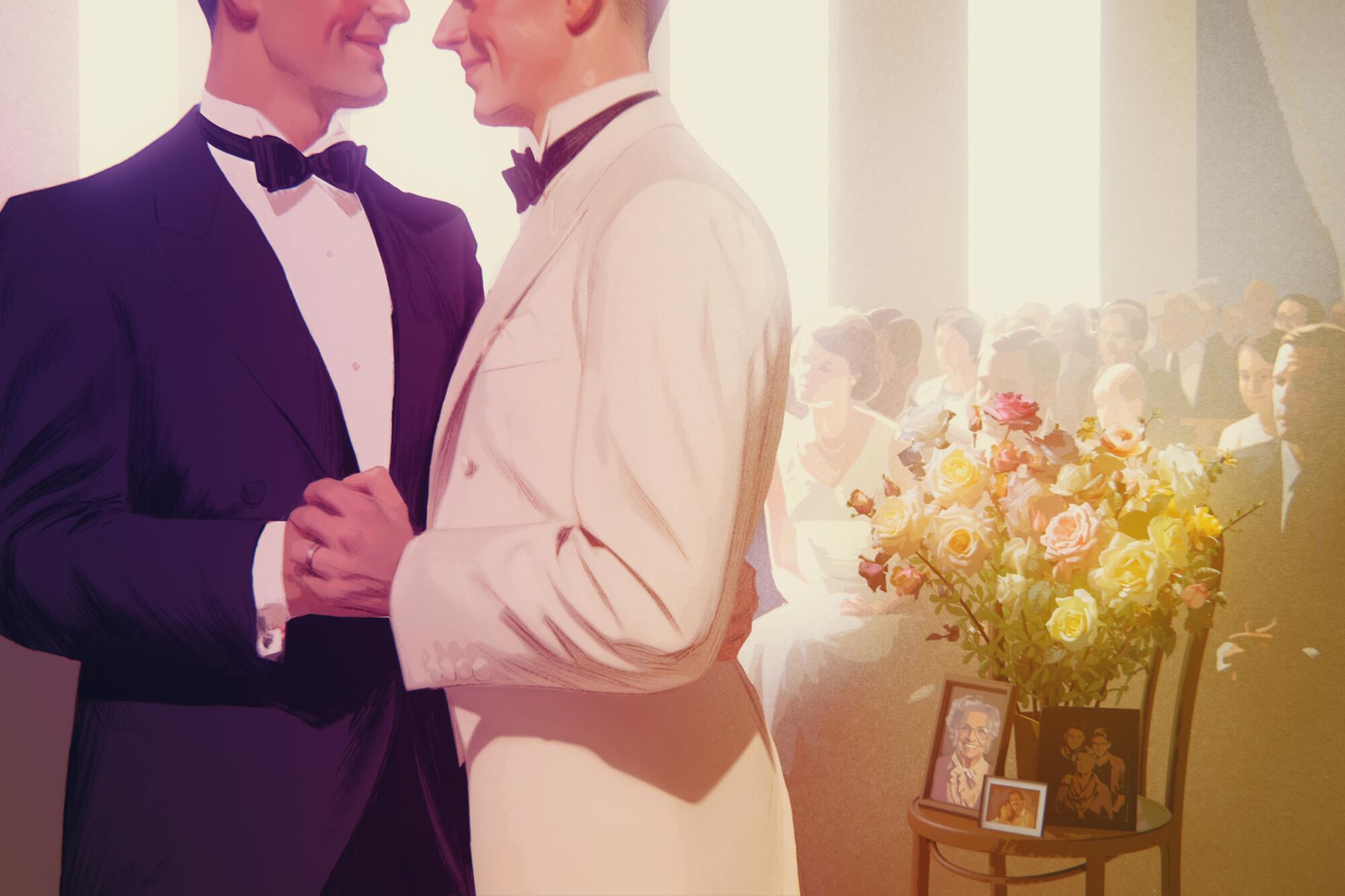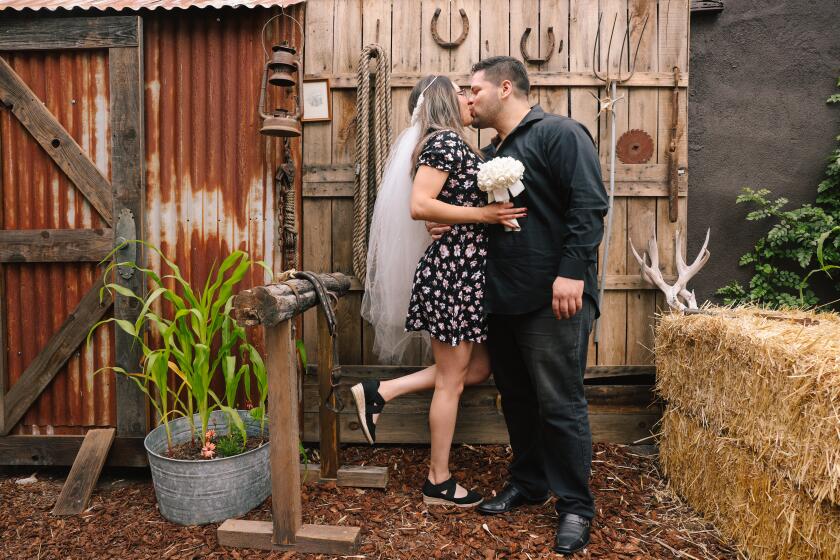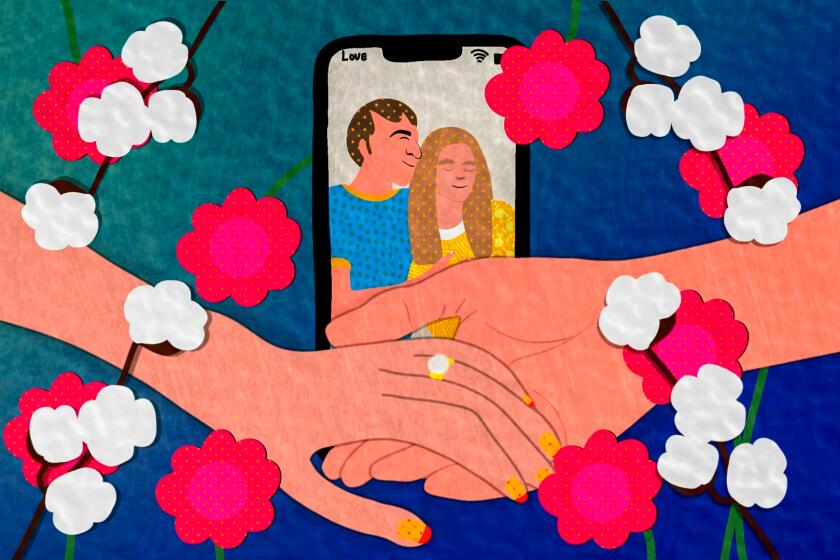
As Ben Fink and Rob Forman approached their chuppah wedding canopy, in the very front row sat an empty chair, the shoes Fink’s mom, Sally, would’ve worn, and a beautiful Gerber daisy — her favorite. Sally had died just 11 days earlier.
As he recalled their wedding day, Fink, 37, began to cry. “Walking down the aisle without her there, my father was holding my arm and we were both crying, and I remember him saying, ‘This is happy, this is happy, we’re happy…’” Fink’s voice broke as he observed, “I was smiling because I was really happy, and I was crying because I was really sad.”
For a moment, the couple laughed. “It looked great in the photos,” joked Forman. “I looked dewy,” agreed Fink.
Just weeks earlier, Sally Fink had told her son, “I’m dying.” With few words, Ben Fink acknowledged this truth. It was October, and after a few blissful months of remission, Sally’s uterine cancer had returned. Despite best efforts from her doctors and endless hopes and prayers from her family, growing weaker and weaker, Sally lay dying in a Miami hospital. Ben Fink was weeks away from his big, colorful, joyous, gay, Jewish wedding with Forman, his partner of 5½ years.
Tears fell from the Tarzana-based couple’s eyes as they reflected on the story of Sally’s death in the days leading up to their wedding.
“I had flown out just to kind of cheer her up,” said Ben Fink, “thinking maybe if I cheer her up, she’ll feel better and she’ll miraculously get better. What if she dies? was never part of the conversation.”
Few people plan for a tragedy while scheduling a joyful occasion. As Sally’s health deteriorated, the couple’s uncertainty about their wedding plans went unspoken. Fink’s dad, a rabbi, was to officiate at the wedding. While Fink was with his family in Florida, Forman spoke privately with friends about the situation.
“I did not know where we were going to be emotionally or who was physically going to be in Los Angeles,” said Forman, 39. “I did not think we were going to proceed, because we were in that awful, nebulous, waiting-for-news period.” The ambiguity added to the grief, sadness and stress for the couple.
A wedding ceremony — loaner dress and suit included — for about $600? A beach elopement for $399? Meet the couples choosing tiny, affordable nuptials.
A great sense of uncertainty looms when families must decide how — and if — to host a planned celebration like a wedding after someone dies. Grief, sadness and stress over the loss of a beloved family member are often compounded by religious or cultural expectations.
However, couples have planned their ceremonies and celebrations, many take special care to incorporate the memories of their loved ones into their celebration.
Some set up memorial tables full of family photos, wear heirlooms sewn into dresses, on lapels or in bouquets, or adorn empty chairs with a deceased loved one’s favorite flower to highlight their absence. Thoughtful wedding officiants and experienced wedding industry professionals will find ways to articulate the sorrow while celebrating joy.
But if a tragic loss is quite recent, should you cancel? I’ve dealt with this question before as a rabbi and spoke to religious leaders and couples I know to hear their perspectives. The Rev. Matt Oprendek, of the Episcopal Diocese of New York, said that while there is no set Episcopal tradition, any time there is an unimaginable loss, it is handled according to whatever a minister thinks is most appropriate.
While Muslim practice varies, Imam Shady Alshorman of Clermont, Fla., said that while Islam does not obligate a couple to postpone a wedding, some might delay it if holding a celebration could result in severing ties of kinship.
For Ann Arbor, Mich.-based Muslim chaplain Jaye Star, her extended family was planning a wedding in Turkey in May. The catastrophic earthquake that killed tens of thousands in the region in February, however, led them to dramatically downsize a massive wedding celebration to include only immediate family; it was considered inappropriate to celebrate amid the grief others were feeling.
Jewish tradition, however, is quite clear. A teaching in the Talmud, an ancient collection of Jewish law and practice, explores a scenario where a funeral procession and a wedding procession meet in the center of town. While those in the funeral procession are wailing in grief, the members of the wedding procession are jubilant. The Talmud queries: Who gets the right of way? Ultimately, rabbinic sages teach that “the honor of the living takes precedence over the deceased” and the wedding procession proceeds first.
Joy may lead the way, but “whether [a loss is] recent or not,” said the Rev. Sharon Dickinson, director of spiritual care at Salem Hospital in Massachusetts, “the veil is very thin on days like that.”
Seminary, chaplaincy and social work students are taught to weave joy and sorrow together, recalling deceased loved ones and making space for grief and tears, in lieu of hampering critical emotions.
In this week’s newsletter, we’ll explore theories on why we have so-called “grief dreams,” what forms they can take, and what they can tell us about our waking life.
Dan Fuller married Leah Goldstein in Austin, Texas, in December 2021. Dan’s mother, Karen Donahue, a practicing Buddhist, had been deceased for many years but her absence was palpable. As the rabbi at their wedding on the seventh night of Hanukkah, I wove together teachings from Zen and Hasidic masters, all of whom understood the power of grief and suffering and also the potential for light and love. In that moment, even those who never knew Donahue needed to remember her and feel grief over her death so that we could all experience a night of joy.
When Julie Sullivan of Framingham, Mass., got married last fall, she remembered her brother John by pinning a photo charm of him to her bouquet. She also adapted her Jewish wedding contract, known as a Ketubah, with her husband, Jeff Green, to remember her brother. While Ketubah language typically denotes only a couple’s parentage, their text reads: “Julie, daughter of John and Sheila, sister of John, of blessed memory.”
For their wedding, Forman and Fink incorporated Sally Fink’s favorite flowers, a suggestion from their L.A. wedding planner, Holly Gray of Anything But Gray Events. “Getting to help honor [Sally] on their wedding day, while keeping the moment as light and positive as possible, was my pleasure to help ease an impossible situation for any couple to face,” Gray said.
Early Oct. 4, Sally Fink died. Adding further stress for the family, it was only hours before the start of Yom Kippur; the typical urgency of Jewish burial within 24 to 48 hours was delayed amid a full season of Jewish holy days. Fink was buried five days later in Simi Valley. The family sat shiva — a weeklong period of mourning in Jewish tradition — at Fink and Forman’s home. Because Sally loved a party, loved their backyard and also loved Jameson, at shiva they served drinks, swam in the pool, shared memories and recited the Kaddish memorial prayer together. The final night of shiva was attended by the guests who had come into town for the wedding. Ben’s dad told them that the timing of Sally’s death was a terrible gift. If she had died any closer to their wedding date, it would have been too difficult. Recalled Ben Fink, “The whole experience was a delirious daze.”
I found myself in a sweet romance with a man from Orange County. Just after we picked our wedding date, I was diagnosed with pancreatic cancer.
Fink reflects back on their wedding day on Oct. 15 at the Ebell of Los Angeles, a popular venue. “With the makeup and the hair and then the tuxedos, that whole experience… you get swept up in it. There was a lot of energy, and that was really exciting. And then once my family arrived and we had to do the family photos, that’s when it really hit me. Oh, s—, she’s not here. That’s when the absence of her was most felt. And I remember my dad walking into the ceremony hall and seeing the chuppah, and we broke down in tears because we knew she would’ve loved it.”
“The whole experience was surreal, there’s no other word to describe it,” Forman said. “It was all the things — emotional, powerful, unforgettable, and a blur, and impossible — but we did it.”
“You know how they say with drag queens, the glitter is just a mask and it sometimes hides the sorrow underneath? It was kind of like that,” Fink added. “We looked fabulous. We were beautiful, we were happy, and yet, there was still sadness, and it was ever present.”
More to Read
Sign up for The Wild
We’ll help you find the best places to hike, bike and run, as well as the perfect silent spots for meditation and yoga.
You may occasionally receive promotional content from the Los Angeles Times.














